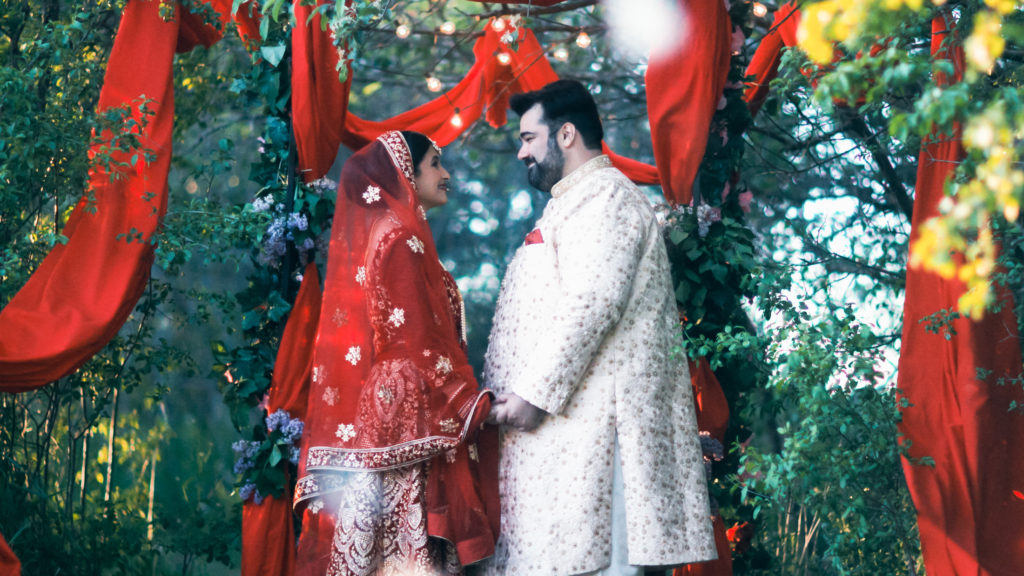For all its striking South Asian costuming and colour, Sāvitri, Against the Grain Theatre’s latest digital initiative, is not an inherently Indian stage piece. It is an English chamber opera, rich in atmosphere, written by a venturesome English composer, Gustav Holst.
Composed in 1908, Holst, ever the restless seeker of inspiring post-Victorian sources of expression, found himself drawn to the great sprawling Sanskrit classics of ancient Indian literature early in his career. Sāvitri, a tender incidental episode in the otherwise colossal 75,000-verse martial epic, the Mahābhārata, tells the touching tale of a wood-cutter (Satyavān — depicted by Holst in decidedly egalitarian guise, a marked departure from the classic exiled princely character) and his divinely favoured wife (Sāvitri) and of a mutual devotion so deep, so strong that even Death must surrender to the force of its eternal existence. To love is to live is to love — as much philosophical expression as arresting story-telling. Issues of morality and well-being, head and heart, body and soul all factor into the mix and it is this aspect of Sāvitri, that gives Holst’s self-penned libretto great humanity, an overarching textual feature made abundantly evident in Director Miriam Khalil and Associate Director Simran Claire’s highly respectful handling of narrative.
Filmed on location on picturesque farmland in Ontario’s idyllic Prince Edward County late last May, AtG’s rich, gloriously sensual realization of Holst’s discreet discourse on earthly compassion plays out against a lush panorama of dense woodland and sheltered clearings. Plucked from The Vana Parva (The Book of the Forest), Sāvitri is inexorably rooted in nature. Director of Photography Dylan Toombs evokes an intensely mutable world overhung with joy and dread. Death (splendidly sung by bass-baritone Vartan Gabrielian) strides from hiding amid a clump of huddled trees. I am he who leads men onward, he intones, camera hesitating at the edge of a shadowy country track. I am the road that each must travel. Coloured smoke, perhaps loosely inspired by the rainbow powder-throwing festival of Holi, references maya (illusion) — an interpolated theme introduced by Holst not present in the original story — engulfing the principals, shrouding their thoughts. Freed from fear, Sāvitri and Satyavān (glowingly portrayed by soprano Meher Pavri and tenor Andrew Haji) walk hand in hand across a windswept field. Your thoughts are mine, my spirit dwells within you, sings Sāvitri. When you are weary, I am watching./When you sleep, I am waking./When in sorrow, I am near. The visual equivalency of word and image is exceptionally well gauged.
Seen from the perspective of his times, Holst’s opera is unique, a sincere, serious-minded delving into the profoundly fertile culture of a vast subcontinent that had long fascinated his fellow countrymen and left them reeling. Blending vibrant Indian Hindu elements of legend and myth with his own rather non-specific attitude to spiritualism, Holst fashioned a work that was neither pastiche nor wholly authentic, a taut coherent adaptation of the infinitely more expansive, multi-character Sāvitri – Satyavān saga as related in the Mahābhārata. Focus and clarity were key for Holst. Monodrama demanded it.
Adopting a story-in-story approach, Khalil and company take a slightly more expansive view of Holst’s compact libretto, providing valuable context in the form of a brief spoken prologue related by Pavri in her demanding role as Sāvitri by way of succinct backstory, revelation deepening drama and understanding — a deep breath before the music plays.
Built layer on layer from two opposing compositional styles, the underlying structure of Holst’s stirring romantic score for Sāvitiri quickly reveals itself. Mystical and supernatural features — Death and maya — are expressed in unmistakeably Wagnerian terms with assertions of love and everyday life conveyed in a discrete folk-flavoured style. The tension between the two musical polarities is crisp, calculated and hugely effective. This is very much a singer actorly opera, a feature made abundantly manifest in AtG’s expressly performer-centric realization. Voices fill entire frames.
Risking Death’s displeasure, all dark descending tones and rumbled harmony, Sāvitri pressures him to grant her wish for life in all its completeness. Are you the Just One? Are you Death? Or are you a blind spirit knowing nothing of what is around you? A fraught moment, great swaths of insistent major chords swelling around her. With her bright cloudless top and seemingly infinite loft, Pavri commands.
Satyavān’s song sung as he trudges home through the forest after a long day, firewood bundled under his arm, axe in hand — Like a spectre of the forest, night’s gloomy shade is drawing near — though not derived from any particular English folk melody is most definitely folk-like drawn from Holst’s study of distinctly English tonal patterns. Haji is very much in his element here, his warm wraparound middle voice comfortably embracing Holst’s personification of the archetypal common man.
As per the composer’s instructions, a taut wordless 8-singer women’s chorus greatly extends the realm of harmonic possibility. Orchestration is as prescribed — double string quartets, two flutes, English horn and contrabass — precorded, as were voices, in a strict pandemic regulated environment at Pie in the Sky Studios in Toronto’s East End. Simon Rivard conducts.
Sarod virtuoso Arnab Chakrabarty and tabla player Shahbaz Hussain contribute a finely filigreed set of hauntingly beautiful original Indian compositions by way of Prelude and Postlude.
Sāvitri is a challenging opera, simultaneously complex and unadorned. AtG more than does it justice. This is an enchanting production, sensitive and gracious, one that pays homage to a visionary work that came into being more than 100 years before its time.
* * *
Sāvitri is available, streaming on-demand, until July 11th. Free registration at https://againstthegraintheatre.ticketleap.com/savitri


